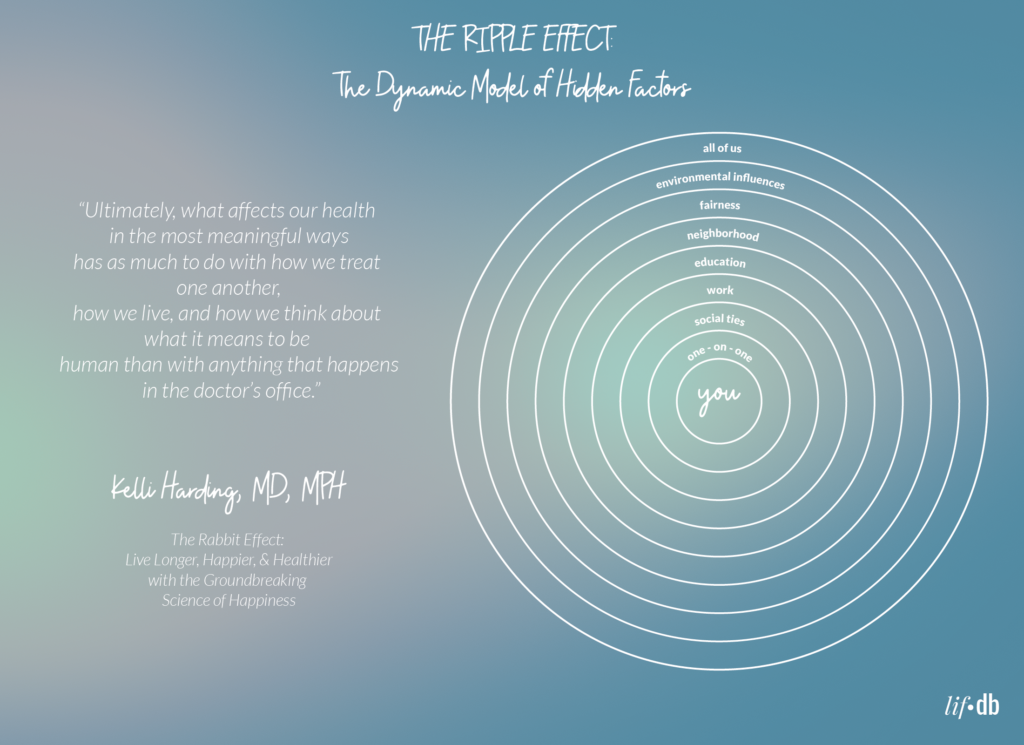The Question
With all of the advances in biomedicine and the amount of money spent on healthcare, why aren’t we getting any healthier?
This is the central question the book tries to answer. Dr. Kelli Harding argues that the lack of focus on the sociological factors that affect our health, or what she refers to as the “hidden factors” is the main reason.
Ultimately, what affects our health in the most meaningful ways has as much to do with how we treat one another, how we live, and how we think about what it means to be human than with anything that happens in the doctor’s office.
The author gleans on existing research and her first-hand knowledge working as an emergency room psychiatrist to argue that kindness, from and to ourselves, family, community, and strangers, go a long way to improving measures of health. Our likelihood of being sick starts when we are born, how and where we grow up, our work, and where we live. The people around us and our environment affect our wellbeing profoundly. By taking control of our environment and recognizing the importance of kindness and compassion, we can all improve our collective health.
In my practice, the sickest people I see often share similar backgrounds: loneliness, abuse, poverty, or discrimination.
The Rabbit Effect
The book title is a reference to a 1978 research, designed to understand the correlation between heart health and high blood cholesterol. Headed by Dr. Robert Nerem, the study used New Zealand white rabbits as subjects, which are known to develop heart disease if fed a high-fat diet, similar to humans.
All the rabbits were fed the same high-fat diet, and at the end of the study, all rabbits had high cholesterol values that were virtually identical–not a surprise there. However, when the researchers examined their blood vessels, a group of rabbits had fewer fat deposits (60% less) in their arteries.
What could have caused this difference? One common factor the rabbits with fewer fat deposits had was the postdoctoral researcher handling them.
They noticed that Murina handled the animals differently. When she fed her rabbits, she talked to them, cuddled and petted them. She didn’t just pass out rabbit kibble—she gave them love.
It wasn’t diet or genetics that made a difference in which rabbits got sick and which stayed healthy; it was kindness.
Our DNA
In teasing out how our environment affects our health, Harding draws from studies on DNA methylation, a process that alters our DNA.
DNA methylation is a biological process by which methyl groups are added to the DNA molecule. Methylation can change the activity of a DNA segment without changing the sequence.
Wikipedia
DNA methylation is known as an epigenetic process, meaning it’s in addition to the genes.
We learn that DNA “is far more flexible” than we originally thought, genetic determinism is not so clear-cut, and that our experiences are embedded in the genome.
From parenting to larger historical events, our personal and collective experiences impact us on a cellular level. Whether it’s babies that lacked socialization, or catastrophic events, such as a famine or an ice storm that stressed out parents and children, experiences alter our DNA.
The good news about the epigenetic process is that if horrific events can affect our DNA, so can positive events, big and small.
Healthy Living Starts with You
We all can affect each other’s health, not just doctors or people with medical training. School officials, urban planners, managers, students, how we treat strangers, we can all contribute to improving our health and those around us. You don’t need a degree to practice empathy, kindness, and compassion. In other words, by adding kindness and humanity in our relationships, our communities, our work, and all facets of life, we all win.
Of course, medical professionals practicing these principles can have a profound effect, and change is already taking place:
Trauma-informed care (TIC) aims to humanize the way we deal with the sick or people in distress, “providing people with more understanding and support.” Instead of asking: “what is wrong with you?”, we shift the mindset to ” what happened to you?”
The Ripple Effect: We Are All Connected
Taking a holistic and panoramic approach to health, The Ripple Effect illustrates how our surroundings impact our health. The book discusses each in detail, supported by studies and medical stories, and followed by a “tool kit” to help apply what we have learned to our own way of living.
I promised I wouldn’t give you a ten-step fitness plan or a two-week diet. Wellness extends far beyond these quick fixes or piecemeal measures.

This summary is not a call to forgo reading “The Rabbit Effect”. We just think that the book has so much to offer and want to highlight parts of it. This synopsis certainly can’t replace the sentiments, details, and stories presented, or capture Dr. Kelli Harding’s inspired writing.
